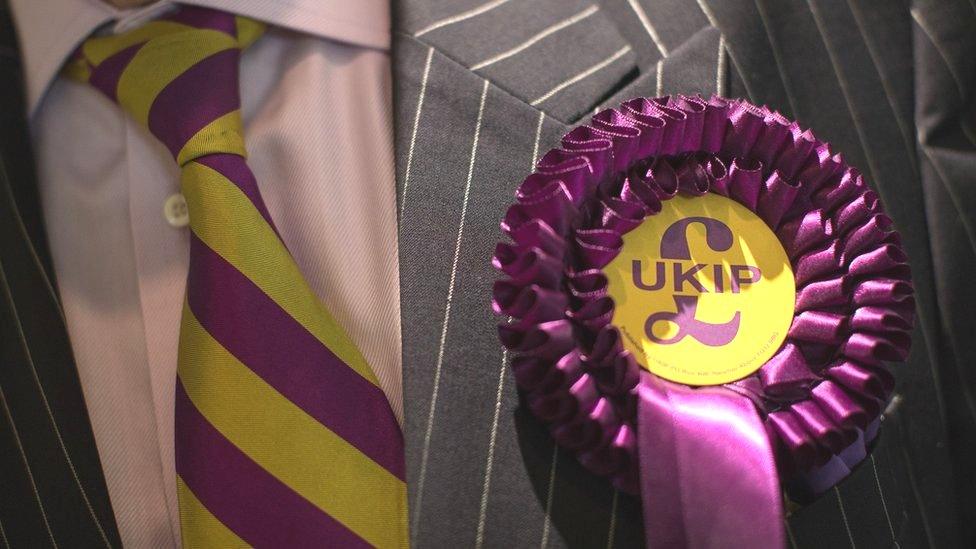Welsh election: UKIP promises referendum to scrap Senedd
- Published

The party won seven seats at the last election, but of the group only Neil Hamilton remains in the party
UKIP has pledged to hold a referendum on scrapping the Welsh Parliament.
Its manifesto for the Senedd election pledges to scrap measures to help asylum seekers and refugees in Wales, end the smacking ban and stop sex education in primary schools.
UKIP Wales leader Neil Hamilton said it was the bravest manifesto "ever set out for moving Wales forward".
The party won seven seats at the last election, but of the group only Mr Hamilton remains in the party.
He told BBC Radio Wales that "being realistic" UKIP would not form the next Welsh government.
Launching the campaign on Facebook on Tuesday, Mr Hamilton said: "By transferring powers away from politicians and directly to the people, this is truly a people-powered manifesto.
"UKIP is the only party that has set out a comprehensive and positive plan for how Wales will be run post-devolution. Unlike other parties, we do not want to simply cede all powers to equally distant political elites in Westminster," he added.
UKIP says it would hold a referendum on the future of the Welsh Parliament "immediately" within the next term.
It said it was the "first anti-devolution party that will set a firm timeline for scrapping the Senedd".
In place of the law-making parliament in Cardiff Bay, UKIP says it would set up directly-elected health boards and "self-governing" grammar and free schools.
At the launch Mr Hamilton also defended a candidate who had sent offensive messages about Muslims on Twitter.

WALES ELECTION: THE BASICS
What elections are happening? On 6 May, people across Wales will vote to elect 60 Members of the Senedd (MSs). The party or parties that can command the support of a majority of members will form the Welsh government. Find out more here.
What powers does the Welsh Parliament have? MSs pass laws on many aspects of day-to-day life in Wales, such as health, education and transport. They also have control over some taxes. Defence, foreign policy and immigration are decided by the UK Parliament.
How do I vote? Anyone who lives in Wales and is registered to vote is eligible, so long as they are aged 16 or over on the day of the election. You can register to vote online, external.

The party said it was pledging to end "the Nation of Sanctuary, external" - a Welsh government plan to help support asylum seekers and refugees.
Immigration policy is not devolved, although the Welsh government has promised to help such groups access health services and integrate into society.
UKIP said Wales "must look after our own people first before opening our doors to the world".
It also promised to end the Welsh government's audit of statues and street names, which found that Wales has 209 streets, buildings, portraits or monuments commemorating people directly involved with the slave trade.
Other policies include:
Scrapping laws requiring councils to provide services in England and Welsh.
Allow parents to pull children out of Welsh language lessons after the age of 14.
Repealing the Welsh government's smacking ban.
Reversing voting rights for non-British citizens in Welsh elections.
Stopping all sex education in primary schools.
Lifting the ban on smoking in pubs, allowing landlords to permit smoking in ventilated rooms.
UKIP says it would freeze business rates at zero for 12 months and create a £100m refurbishment fund for the Welsh tourist industry.
Mr Hamilton told BBC Radio Wales Breakfast with Claire Summers people should be given "the choice" on devolution after 25 years.
He said: "We can't predict with absolute certainty the outcome of the next election. And if enough people vote for us, then, of course, we can form the government. But, being realistic, that isn't going to happen."
'Learned the lessons'
Later, at the manifesto launch, Mr Hamilton said he was "as sure as I can be" that any candidates elected for the party in May will not defect in the future.
Six of the seven UKIP members elected in 2016 left the party during the course of the last parliamentary term.
Mr Hamilton said his party had "learned the lessons" and the selection process this time has been "much more rigorous than the one we had last time".
"I think our line-up of candidates in this election is dramatically better than the field that we put forward five years ago," he said.
Mr Hamilton added that any UKIP members elected "will fulfil that mandate in the same way that I have done for the last five years".
"I can't give you 100% guarantee but I'm as sure as I can be that the people that are likely to be elected this time will stick to the last," he said.

POLICY GUIDE: Who should I vote for?
FIRST TIME: Will 16-year-olds vote?

- Published13 April 2021

- Published6 May 2021

- Published29 April 2021
